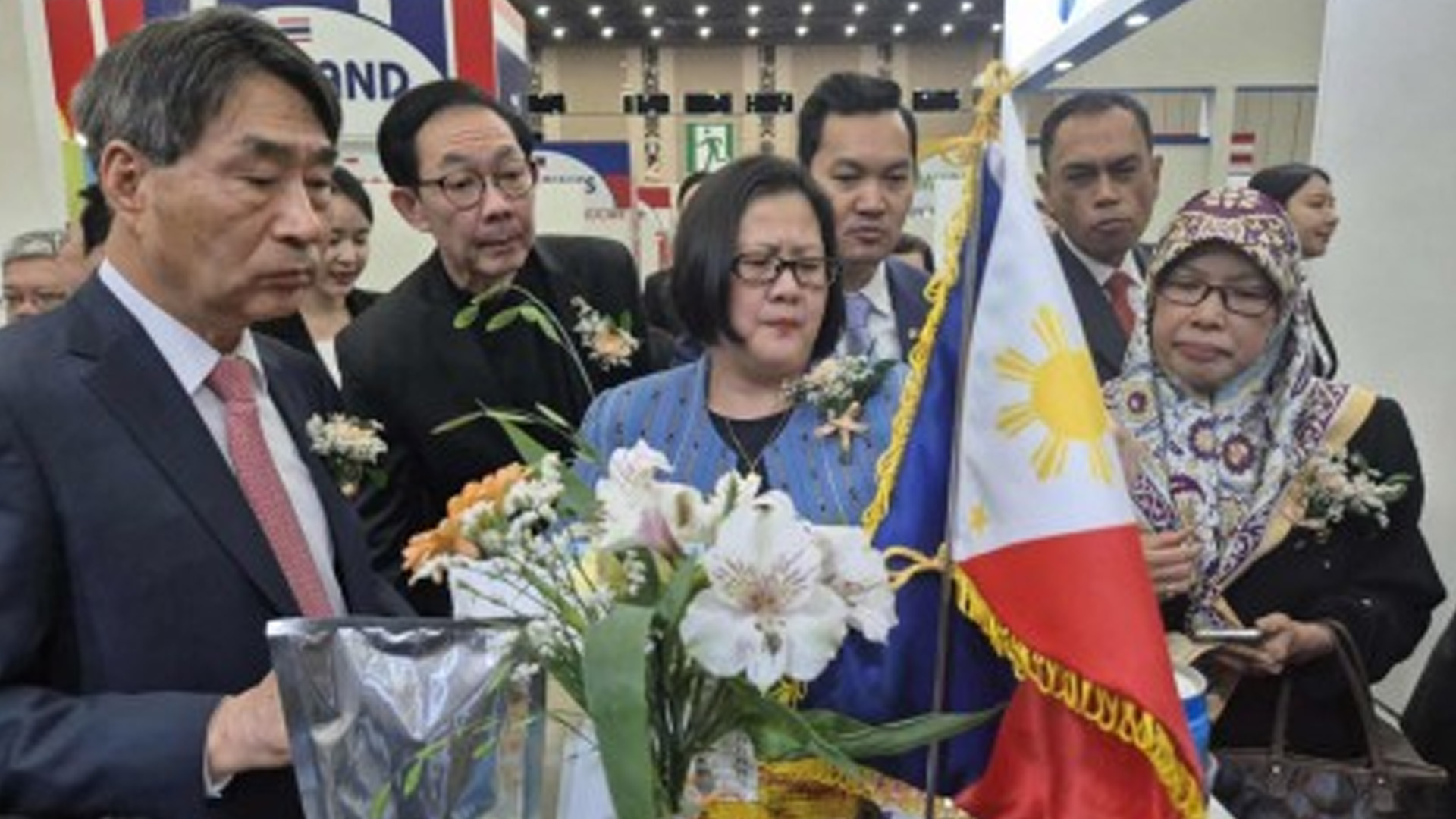The ASEAN Trade Fair 2025, a significant platform for businesses across the ASEAN region, including the Philippines, officially opened at the KINTEX Exhibition Center Friday.
ASEAN-Korea Center Secretary General Kim Jae-shin, together with ambassadors from ASEAN member countries, including Philippine Ambassador to South Korea Bernadette Therese Fernandez, led the ceremonial “switching on” to mark the official opening of the fair.
After the ceremony, the officials toured various booths and sampled wines, chips, nuts, juices, and other food products from ASEAN exhibitors.
In an interview with journalists participating in the ASEAN-Korean Week, Charmaine Mignon Yalong, Commercial Attaché at the Philippine Trade and Investment Center – Seoul, said 10 Filipino companies participated in the ASEAN Trade Fair 2025 from Nov. 12 to 16.
These are La Carlota Food Enterprise, Fruits of Life Inc., Pearl International Inc., JPC Golden Alliance Trading Inc., Jamla Corp., Project Beans Trading, Destileria Limtuaco & Co., Inc., Amley Food Corp., RPO Fine Foods Corp., and See’s International Food Manufacturing Corp.
Yalong said the trade fair provides ASEAN businesses with a vital venue to showcase products, services, and innovations while giving attendees access to industry leaders, emerging market trends, and new business connections.
“Well, of course, South Korea is one of our strongest partners… So, the relationship has always been good, especially with the Philippines-Korea Free Trade Agreement, which just entered into force last December,” she said.
“So, the relationship has always been there. We welcome a lot of investments from Korea, especially in high-value sectors like manufacturing, real estate activities, administrative services, even tourism and retail.”
Yalong noted that the Philippine Trade Investment Center (PTIC), attached to the Philippine Embassy in South Korea, is pursuing expanded market access to Korea, including goods, and connecting Filipino exporters to Korean companies.
“So, there are two ways. It’s either the Philippine companies are looking for importers-distributors in Korea or Korean companies are looking to source from the Philippines, so we provide the service of business-to-business matching, of course, with the help of our colleagues also in DTI (Department of Trade and Industry) and Manila, specifically the Export Marketing Bureau,” she added.
She further said that the PTIC provides guidance to exporters on food safety rules, product registration, and other requirements that vary by country.
The center also facilitates Philippine participation in trade fairs, such as Seoul Food, and endorsed companies for the ASEAN Trade Fair in coordination with the ASEAN-Korea Center.
With Korean companies showing strong interest in renewable energy, manufacturing, and technology, Yalong said the Philippines is ensuring a more investor-friendly environment.
She cited the newly enacted CREATE MORE law, which enhances investor incentives, and noted that Samsung was its first beneficiary following an agreement with PEZA signed last week during President Ferdinand R. Marcos Jr.’s visit to the APEC Summit held in Busan and Gyeongju from Oct. 30 to Nov. 2.
The Marcos administration, she said, is also assisting in all other regulatory frameworks and legal mechanisms.
She said the Marcos administration is also strengthening regulatory frameworks, including improvements to the PPP Code and the right-of-way bill.
The government has likewise implemented a “green lane” system for strategic investments in sectors like renewable energy and manufacturing, ensuring streamlined processes and faster coordination among government agencies, she explained.
“So, the green lanes basically give them easier access. All the processes are streamlined, and we make sure that all government agencies relevant to further investments are all communicating together and making sure that entering the Philippine market is easier,” Yalong said.
Special bond historically
Yalong also underscored the deep historical and cultural ties between the Philippines and South Korea, recalling the Philippines’ role in the Korean War, noting that Koreans remain the top source of tourist arrivals in the Philippines over the past three years.
Many Korean students also study in the Philippines, contributing to the strong demand for products from both countries.
“Korea is also very fond of the Philippines because of our role during the Korean War. We are the first Asian country that sent troops here, and they never forget that.”
Filipinos, she added, are major consumers of Korean content, food, cosmetics, and beauty products, while Korean visitors likewise enjoy Filipino products and culture.
This exchange, she said, reflects the vibrant and enduring relationship between the two nations. (PNA)









